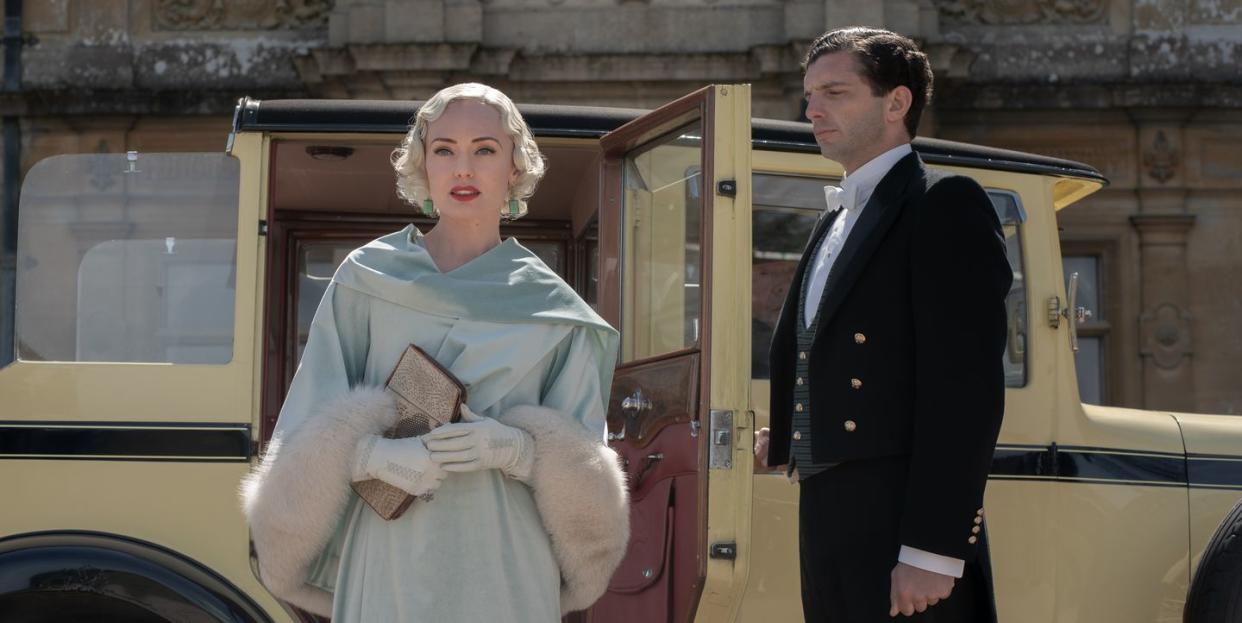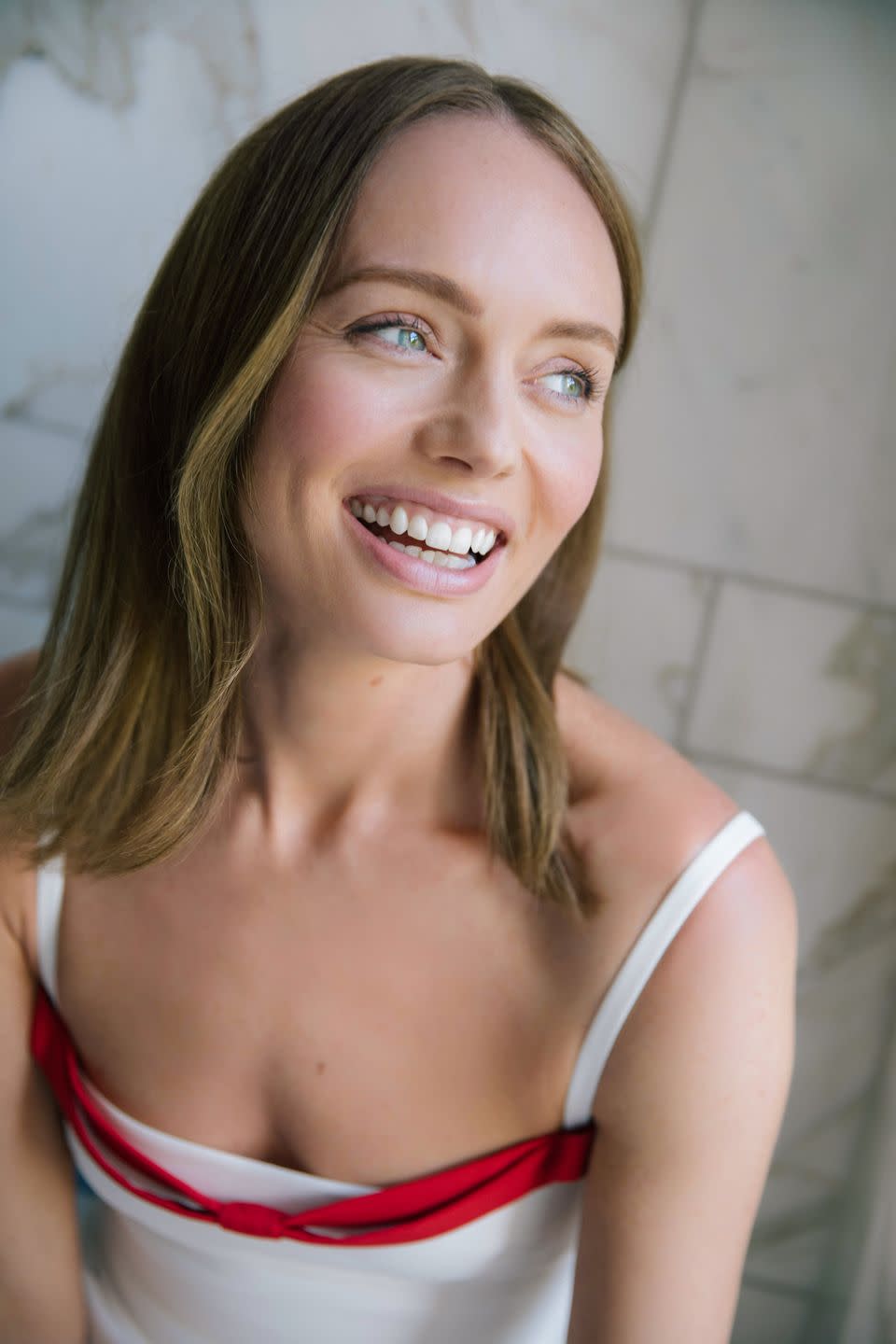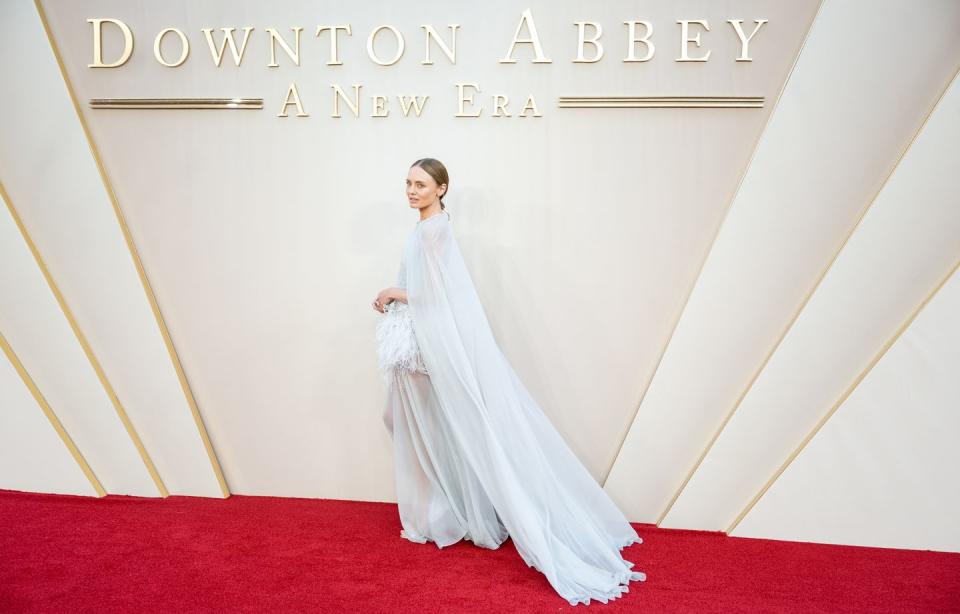History, Hijinks, and Hierarchy: How Laura Haddock Found Her Voice in Downton Abbey: A New Era

- Oops!Something went wrong.Please try again later.
Laura Haddock’s first experience with Downton Abbey wasn’t on set, it was on her sofa. “I'd been a fan for a long time,” the actress says from her Buckinghamshire home. “I vividly remember watching the first season. It was always grab a cup of tea and a snack and get lost for an hour in this lovely world.”
Twelve years later, things have changed. Today, Haddock stars in the just-released film Downton Abbey: A New Era, playing the moody movie star Myrna Dalgleish, who’s living at the country estate while she films a movie that turns unexpectedly from a silent picture to a talkie. And while Myra bursts into Downton like some kind of Golden Age gorgon, upsetting everyone and everything in her glamorous wake, Haddock’s own arrival to the project was a decidedly different experience.
“It was nerve-wracking,” she says, “but then you get there and they're so lovely. This whole company is just so brilliant on and off screen. They create a welcoming environment, and I think they love having new people in. It feels like theater in that way, like ‘come in and play.’”

Which isn’t to say her experience as the new kid was entirely without hazing. “They're all quite mischievous,” Haddock, who previously starred in Transformers: The Last Knight and Guardians of the Galaxy, says of her Downton co-stars. “Because they're so relaxed and comfortable in their environment and because they've been doing it for so long, they can afford to just have fun. Hugh Bonneville [who plays Lord Grantham] said to me on my first day, “Listen, Julian Fellowes doesn't mind a bit of ad-libbing, making the character your own, making the lines your own. Totally fine. We all do it.” And I thought, that doesn't sound quite right. But then they called action, so I did a bit of ad-libbing and ‘cut’ was called. I very quickly realized that is not how it works on the Downton set, and Hugh just looked at me with a twinkle in his eye, like, ‘I didn't think you'd go for it.’”
For his part, Fellowes wasn’t put off. “It was very good, the ad lib,” the Downton creator recalls. “What I do admire is when actors come in from the outside, and they have to fit into a company that's been working together for 12 years, and they just fit in. In Downton, you have to be able to go convincingly from serious and emotional scenes into comedy without it being too disruptive or uncomfortable. And I thought Laura really got that; this character who has been essentially comedic thus far is suddenly able to be quite moving. I thought she was very effective.”
He wasn’t the only one. Director Simon Curtis says, “Laura was inventive; she always came with an idea for the scenes and had a very good instinct for both the comedy and the sadness of the character.” At one point, Haddock needed to film a scene as Myrna in one of her star-making silent film roles—a small moment for Downton, but one Curtis says shows the actress’s chops. “We needed to show what was on screen but didn’t have a script,” he says. “So, I said, ‘Why don’t you come in with a note,’ and Laura said, ‘good idea.’ Then, when I called action, she came in and put the note in her garter belt. It seemed so dangerous and funny and period appropriate, and it totally made the scene. Laura’s what you dream of if you’re a director. You don’t just want people to have ideas, you want them to have good ideas.”

The chance to explore different sides of Myrna is part of what made Downton so appealing to Haddock. “There were so many things that we could play with because actually I was portraying her across different eras,” Haddock explains. “I said to Simon one day, ‘Oh, I'd love a spinoff to play this character.’ We built this storyline for her and would just talk for hours about it. I kind of got lost in creating her world.”
But never so lost that anything feels out of place in Downton’s famously fastidious world. “It's not a documentary, but the feel of it is exactly right,” Haddock says of the universe that Fellowes and his crew created. “There’s a historical consultant there, and he’ll say, ‘You wouldn't cross your legs at this point,’ or would guide you in the way that you'd be holding a glass. But then he and I would have some funny conversations about how Myrna doesn't care. She doesn't have any airs and graces, she hasn't been taught this stuff at finishing school, she's just observed it and chosen to go against it.”
Haddock herself is a quicker study—or at least a less resistant one—than Myrna. While her next projects include an as-yet-untitled spy thriller, and the forthcoming prison drama Tyger, she says the lessons she learned from making Downton will stick with her regardless of who she plays next.
“The big headliner for me with Myrna was just to trust in who you are, don't try and conform,” she says. “Honestly and gracefully find your truth, and that will always be something that will set you free of any fears. It might be rocky in the beginning, but it'll always be better in the end.”
You Might Also Like

